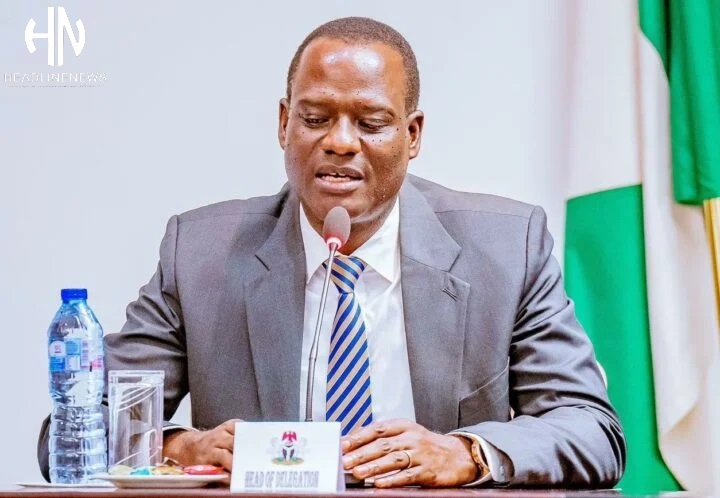The Chairman of the Presidential Fiscal Policy and Tax Reforms Committee (FPTRC), Mr. Taiwo Oyedele, says Nigeria’s economic reforms have significantly reduced the proportion of government revenue used to service debt—from an alarming 97 percent to below 50 percent in just two years.
Speaking on Monday as the keynote speaker at the PwC Executive Summit on Nigeria’s Tax Reform, themed “The New Tax Era: What Nigeria’s Tax Reform Means to Individuals and Businesses,” Oyedele highlighted several fiscal strides made under the current administration. The summit held in Lagos brought together policymakers, business leaders, and financial experts to examine the future of Nigeria’s tax ecosystem.

According to Oyedele, Nigeria was on the brink of a financial meltdown prior to the reforms introduced in the last two years. He cited unsustainable fuel subsidies, excessive money printing, and dangerously low foreign reserves as signs of looming collapse.
“We were spending almost 97 percent of our revenue on debt servicing. Now, it’s under 50 percent,” he said. “Foreign exchange backlogs exceeding $7 billion have been cleared. External reserves have grown from less than $4 billion to over $20 billion. Our budget deficit is shrinking, and investment in infrastructure is rising.”
He warned that if these interventions hadn’t been made, Nigeria’s economic path would have mirrored that of crisis-hit nations like Zimbabwe and Venezuela. To dramatize the point, Oyedele held up a 100 trillion Zimbabwean dollar banknote, explaining that the note couldn’t even buy a loaf of bread when he obtained it.

“Without reforms, Nigeria would be facing runaway inflation, massive unmet FX obligations, and economic collapse. We would be spending over 100 percent of our revenue on debt, printing more money, and sinking deeper into poverty,” he warned.
Missed Opportunities and Reform Potential
Oyedele argued that had Nigeria begun implementing these reforms 10 years ago, the country would today be a $1 trillion economy.
“If we had acted a decade earlier, our GDP would be a trillion dollars, PMS would cost less than ₦300 per litre, and the exchange rate would be below ₦300 to $1. The middle class would be ten times its current size,” he stated.
He cited comparative data showing that while Nigeria’s currency lost over six times its value, peer countries like Kenya and South Africa maintained relative exchange rate stability due to stronger macroeconomic policies.

Subsidies, Debt, and Public Waste
On the issue of petrol subsidies, Oyedele described the pre-reform system as wasteful and corrupt, noting that trillions were spent with little to show in terms of development.
“We were subsidising fuel with borrowed money. NNPC was using its tax remittances—and those of other operators—to fund subsidies. And still, it wasn’t enough,” he said. “If the regime had continued, we’d be holding ₦100,000 and unable to buy a litre of petrol.”
He stressed that the country’s huge budget deficits under the previous administration were financed through printing over ₦30 trillion in ways and means, which did not go into infrastructure but salaries and recurrent expenditure.
Tax System Reforms: ‘Let the Poor Breathe’
Oyedele also addressed criticisms of the new tax regime, stating that reforms were designed to shield the poor and stimulate growth among small-scale operators. He said the reforms legally exempt 97 percent of the informal sector from taxation, focusing instead on high earners and corporate entities.
“Only the top three percent of the informal sector has the capacity to pay taxes. We’ve exempted the rest. When they grow, they’ll pay. But if you lie about your size to avoid taxes, there will be consequences,” he warned.
He described the evolving system as “progressive and transparent,” noting that all major taxes under the new regime have been designed to be equitable and efficient. He also revealed that the gazette for the new tax law, signed by President Tinubu on June 26, is currently being printed, with full implementation expected from January 1, 2026.

International Taxation and Business Impact
Chijioke Uwaegbute, Partner and Tax Leader at PwC Nigeria, elaborated on significant changes under the new law. Notably, foreign entities controlled or effectively managed from Nigeria will now be subject to local taxes. In addition, indirect share transfers involving Nigerian subsidiaries will also trigger tax liabilities within the country.
“If a foreign entity controlling a Nigerian company is sold, it’s now treated as a taxable event in Nigeria,” Uwaegbute explained. “We’re aligning our tax framework with global best practices to close loopholes and ensure Nigeria captures its fair share of revenue.”
Other major changes include exempting employees earning under ₦800,000 annually from personal income tax, harmonising federal taxes, and making the Federal Inland Revenue Service (FIRS) the sole collector of federal taxes.

PwC: Real Change Requires Collective Commitment
In his closing remarks, Sam Abu, Regional Senior Partner for PwC West Market Area, lauded the reform efforts but stressed that policy alone is not enough.
“It requires genuine commitment from everyone—government, business leaders, and citizens. We must engage with integrity and optimism to shape a better Nigeria,” he said.
He added that PwC remains committed to simplifying tax compliance, helping businesses navigate risks, and building a more robust and inclusive economic environment.
The tax and fiscal reforms are among President Tinubu’s most ambitious economic policy moves aimed at stabilising Nigeria’s economy, improving investor confidence, and ensuring sustainable long-term growth. While the road ahead remains challenging, policymakers insist the country is now on a stronger path than it was just two years ago.




